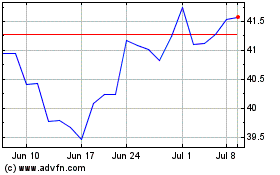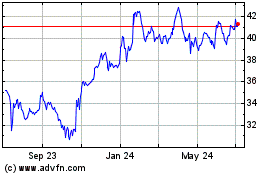Huawei Sues Verizon in U.S. Over Patents
February 06 2020 - 3:46AM
Dow Jones News
By Dan Strumpf
HONG KONG--Huawei Technologies Co. filed a lawsuit against U.S.
carrier Verizon Communications Inc. to demand it pay fees for the
use of a dozen patents in its networks, escalating a long-simmering
dispute between the two telecom giants.
Huawei's lawsuit, filed in federal district court in Texas late
Wednesday, argues that Verizon should pay the Chinese company for
its use of a variety of telecommunications technologies patented by
the Shenzhen-based company, which is the world's largest maker of
telecommunications equipment and the No. 2 seller of cellular
phones.
The Wall Street Journal first reported last year that Huawei was
demanding payments from Verizon for allegedly using its patents
without a license. The lawsuit comes after the two sides met
numerous times in the U.S., as recently as last month, to discuss
the dispute without a resolution, according to the lawsuit.
Song Liuping, Huawei's chief legal officer, said Verizon has
"benefited from patented technology that Huawei developed over many
years of research and development." The lawsuit doesn't specify a
monetary value for the patents at issue, and says compensation for
Huawei should be determined at trial. Verizon didn't immediately
respond to a request for comment.
Huawei's move is likely to further inflame tensions between the
Chinese company and Washington, which for years has blocked Huawei
from selling its products in the U.S. and has been lobbying allies
against using its equipment in their 5G network rollouts. U.S.
officials believe the Chinese company's gear could be used to spy
for Beijing or disrupt communications, which Huawei denies. The
Wall Street Journal has reported that the company has a history of
being accused by rivals of technology theft.
The Trump administration's anti-Huawei campaign faced a setback
last week when the U.K. decided to allow Huawei to supply 5G
technology to its carriers, with restrictions on its use in
sensitive parts of the network and a cap on the company's 5G market
share. The European Union last week also stopped short of
recommending a ban to its members.
The U.S. administration has also been pushing to tighten rules
enacted last year restraining American technology companies from
selling parts and software to Huawei, but the effort was paused
following pushback within the administration.
Some U.S. allies have blocked Huawei in their 5G networks,
including Australia, New Zealand and Japan. On Wednesday, Nicholas
Jonathan Read, the CEO of Vodafone Group PLC, said the European
carrier would remove all Huawei gear from sensitive "core" areas of
its EU networks over five years at a cost of about 200 million
euros ($220 million) after a pause on new purchases for those parts
of its networks last year.
According to the lawsuit, Verizon is using Huawei's technology
without a license in several applications, including in its routers
and switches and in enterprise services. Verizon isn't a customer
of Huawei. The lawsuit references technologies allegedly used by
Verizon and branded by other vendors such as Cisco Systems Inc.,
which competes with Huawei in telecom equipment.
The patents at issue involve longstanding telecom technologies
such as those for optical transmission and digital communications.
They don't concern next-generation 5G technology.
It is the third recent high-profile lawsuit that Huawei has
filed in the U.S. Last year, the Chinese company sued the Trump
administration, seeking to block a law prohibiting U.S. agencies
and contractors from buying its products. It is also suing the
Federal Communications Commission over a rule prohibiting U.S.
rural carriers from accessing a federal subsidy to buy Huawei
equipment.
Write to Dan Strumpf at daniel.strumpf@wsj.com
(END) Dow Jones Newswires
February 06, 2020 03:31 ET (08:31 GMT)
Copyright (c) 2020 Dow Jones & Company, Inc.
Verizon Communications (NYSE:VZ)
Historical Stock Chart
From Mar 2024 to Apr 2024

Verizon Communications (NYSE:VZ)
Historical Stock Chart
From Apr 2023 to Apr 2024
